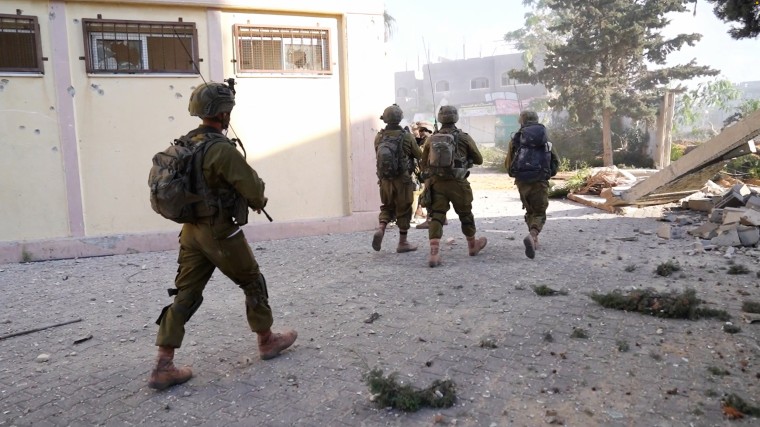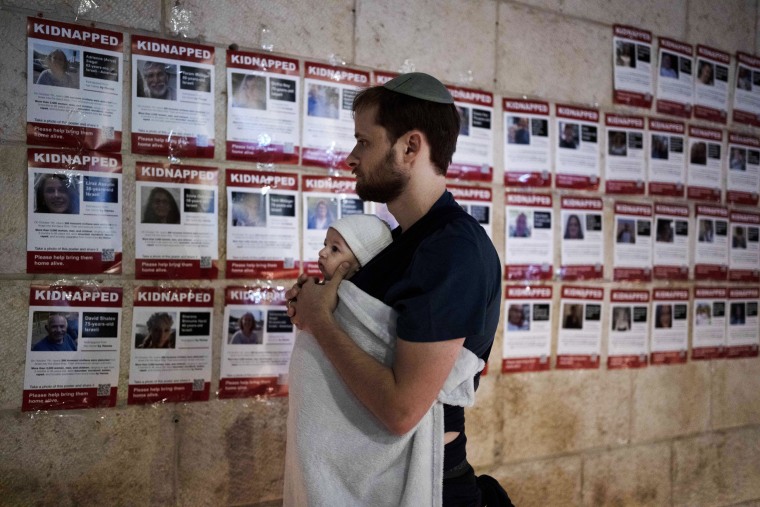Israel and Hamas have agreed to a breakthrough deal to release 50 women and children who were kidnapped and held in Gaza, a potential landmark deal that will also involve a four-day pause in fighting, the delivery of hundreds of aid trucks, and the release of 150 Palestinian women and children held in Israeli jails.
The fate of some 240 hostages captured in the Hamas terror attack Oct. 7 has been a source of anguish in Israel, with regular demonstrations demanding their release and mounting political pressure on Prime Minister Benjamin Netanyahu.
The deal comes after weeks of mounting pressure from the United States and other countries over the fate of civilians in Gaza, where local officials say more than 14,000 people, including 5,000 children, have been killed in Israel’s aerial bombardment and ground assault, with more than 1.6 million Palestinians displaced in a mounting humanitarian crisis.
After growing reports a deal was close, the breakthrough was announced early Wednesday local time (late Tuesday ET) by Qatar, the Gulf state that hosts Hamas leadership and worked alongside the U.S. and Egypt to broker the agreement.
Israel’s government approved the deal early Wednesday local time. Hamas, which carried out the Oct. 7 attack that Israel says killed some 1,200 people, confirmed the deal in a statement, casting it as a chance to “consolidate the will of our victorious resistance.” It said that all hostages exchanged by both sides must be under the age of 19, although this detail was not mentioned by any other party.
Three Americans could be part of the first group of hostages released: two adults and a 3-year-old girl named Abigail, a senior Biden administration official said.
The pause, the start time of which is yet to be announced, is set to last four days, an Israeli official said. Israeli drones — responsible for much of the bombardment, and whose buzzing noise is a constant psychological burden on many Palestinians — will stop flying over the strip for six hours a day as Hamas consolidates the remaining hostages, the official said. Some captives are being held by other militant groups, including the Palestinian Islamic Jihad.
The deal includes an option to extend the pause in exchange for 10 hostages released per day, the Israeli official said.
Meanwhile, more fuel trucks will be allowed to enter Gaza, which Israel had previously resisted on the grounds this can be used by Hamas to launch rockets and power tunnels, along with as many as 300 to 400 daily humanitarian aid trucks, according to a senior U.S. official and a source familiar with the talks in the region.
A senior Israeli official who outlined the deal said the government would release 150 Palestinian women and children, none of whom are accused of killing Israelis directly.
Netanyahu’s office released a list of 300 prisoners eligible for release under the agreement. On the list, 123 are teenagers between the ages of 14 and 17, held on allegations from throwing rocks and contacting banned terrorist groups, to attempted stabbings and planning suicide attacks. There are 33 women, ages 18 to 59, accused of crimes such as nonfatal stabbings and recruiting and transferring money for terror groups. And 144 are 18-year-old males, who appeared to fall outside the original criteria put forward by Israel, meaning it was unclear when they would be released.
Israel is holding more than 4,700 Palestinians, including 146 minors, in detention on what it calls “security grounds,” according to the Israeli human rights group B’Tselem. In additional some 1,300 Palestinians are under “administrative detention” — which means they are being held without trial and without having committed an offense, on the grounds they plan to break the law in the future — B’Tselem says.
In addition, the Red Cross is expected to be allowed access to the hostages who remain in Gaza, including to provide them with medicine, said an Israeli official briefed on the proposed deal.

The agreement capped what the Biden administration official described as an “extremely excruciating five-week process” to free the hostages.
President Joe Biden was directly involved in the negotiations and received hourly updates on the progress, the administration official said. Among the sticking points, they said, were Israel’s requirement that Hamas provide identifying information and “proof of life” for the hostages and Hamas’ demand that fuel enter Gaza.
Bidensaid in a statement late Tuesday he welcomed the agreement.
First lady Jill Biden “and I have been keeping all those held hostage and their loved ones close to our hearts these many weeks, and I am extraordinarily gratified that some of these brave souls, who have endured weeks of captivity and an unspeakable ordeal, will be reunited with their families once this deal is fully implemented,” he said.
Before the deal was announced, Netanyahu stressed that it would not mean the war with Hamas is over.
“We are at war, and we will continue the war until we achieve all our goals — to eliminate Hamas, to return all our hostages and missing persons and to guarantee that there will be no factor in Gaza that threatens Israel,” he said in remarks Tuesday before the Cabinet vote.
“There are stages in a war, and there are also stages in the return of the abducted,” he added.

One remaining hurdle is that Israeli victims of alleged Palestinian attackers held in jails have a right to appeal a deal involving the prisoners’ release to the Supreme Court within 24 hours. So the deal is not final until that period closes.
Only four hostages have been released so far: Nurit Cooper, 79; Yocheved Lifshitz, 85; and two Americans — Judith Raanan and her teenage daughter, Natalie. Israeli forces also freed a soldier who had been taken captive, Pvt. Ori Megidish, 19.
Last week, two hostages were confirmed dead by the Israel Defense Forces: Yehudit Weiss, 65, a mother of five captured in the Be’eri kibbutz, and soldier Noa Marciano, 19. Their bodies were found near Al-Shifa Hospital in northern Gaza, the IDF said.






